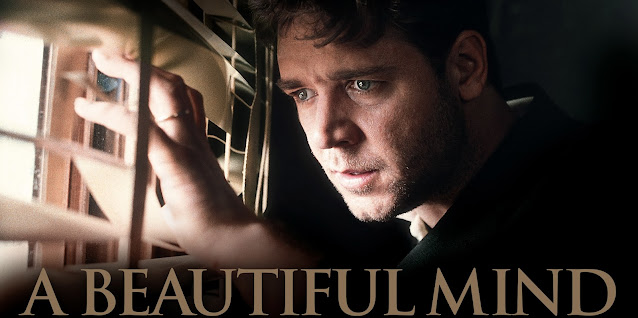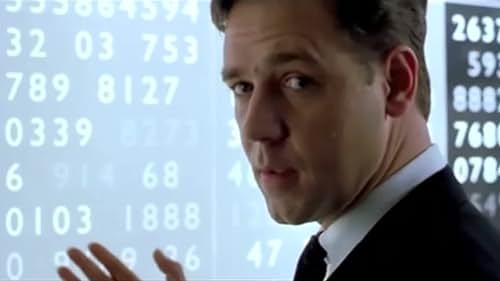It is not impossible to craft a compelling big budget drama without it being tethered to an existing IP or franchise. Ron Howard proved this over twenty years ago when crafting A Beautiful Mind, the mostly factual story of John Nash (Russell Crowe), a brilliant mathematician who struggled for most of his adult life with schizophrenia. As with most bio-pics, this film takes many liberties with the facts but does so in service of an overall narrative structure and a central theme. The movie isn’t groundbreaking in the slightest but it doesn’t need to be. It’s compelling and carried by two outstanding performances by Russell Crowe and Jennifer Connelly, both of whom were nominated for Academy Awards. Crowe lost to Denzel Washington for Training Day, a fine performance itself, but not on the same level as what Russell Crowe accomplishes here.
The film depicts John Nash from his first days at Princeton through the early years of his marriage with an epilogue of his later years as a teacher and Nobel Prize winner. By focusing on this time in his life it allows the movie to remain focused on what makes this story interesting. We do not need scenes from his childhood to understand the man in his twenties and thirties. Right away we can see that Nash has some sort of mental issues plaguing him. Those unfamiliar with John Nash’s life story may think it’s a form of high functioning autism as he is obsessed with numbers and patterns, distilling things like birds fighting over food and even male and female socialization, down to patterns. Later he will begin seeing patterns in random newspaper and magazine articles and start obsessively cuting out headlines and pictures and creating elaborate collages of these connections in the name of Cold War politics.
At one point, though, his perceptions of reality come crashing down around him and, after seeing potential Soviet agents at one of his speeches, he flees mid-speech and ends up getting tackled and taken to a mental hospital where he’s diagnosed with schizophrenia. People he’s known for years and interacted with are not real, made up in his mind to feed into his obsessions. These include his college roommate, Charles (Paul Bettany), Charles niece Marcee (Vivien Cardone), and William Parcher (Ed Harris) of the Department of Defense who drives Nash to keep digging for secret messages in everyday newspaper articles. Nash is treated for the condition, given medication and eventually sent home. But the medication has left him impotent and, frustrated, he begins to skip his doses which leads to the hallucinations all over again. He unintetionally hurts his wife, Alicia (Jennifer Connelly), and she flees the house with their infant son. More medication and a personal breakthrough allows Nash, still seeing people who are not there, to ignore his hallucinations and lead a somewhat normal life.
When the film first came out Nash was still teaching at Princeton, walking to campus every day. That simple statement leads into the end credits and evokes an emotional response thanks to the proceeding two hours of film. The simple act of walking to campus symbolizes the struggle Nash dealt with every day through no fault of his own. Since the film released, Nash, as well as his wife, have passed on, killed in an automobile crash after an awards banquet in his honor. They died together like they were destined to never be apart. Although it hadn’t happened at the time of the movies release, this same sentiment is shown as Nash is accepting his Nobel prize and dedicating it to her, his reason to live. In reality, the two divorced decades before this moment, yet she took care of him for over thirty years before they eventually married again in 2001. Their relationship really was destined to be.
Nash’s eccentricities are clearly seen early on. He’s socially awkward and nearly fails University when he spends more time trying to publish a truly original idea than attend his classes. He attempts to bypass societal norms with a stranger in a bar, offering to skip the niceties like buying her a drink and getting to know her, and just jump straight to sex. This interaction earns him a drink thrown in the face and teasing from his classmates. Only later will it be revealed that even back then he was seeing and interacting with someone who wasn’t really there. These hallucinations get worse, however, once he’s married and has a son.
The story of Nash is a sad one full of heartache and sadness but it’s also an uplifting one. Nash will eventually reason with himself how the people he’s seeing cannot possibly be real because they never age, especially the young girl Marcee who remains a young girl long after she should have grown up. Knowing these things doesn’t always prevent him from having breakdowns with reality, though, but it’s a step in the right direction.
There was a time for about a decade when Russell Crowe was at the top of his game, taking on characters as interesting and nuanced as this. While he’s still acting he seems to have gone into cruise control, not really trying to take on challenging and interesting roles like this anymore. It’s really too bad as he is a great actor when given the right roles. This could have been a hammy over-the-top performance yet it is amazing to watch him disappear into it the way he does. Even towards the end, when old age makeup is used heavily, his mannerisms, his slow shuffling walk are dead perfect, selling the effect. Everything Crowe is doing here overshadows even the great performance Connelly is giving and she was the one to win an Oscar for it. They both should have won that year. This film lives and breathes because of those performances.
Academy Award Nominations:
Best Picture: Brian Grazer and Ron Howard (won)
Best Director: Ron Howard (won)
Best Actor: Russell Crowe
Best Supporting Actress: Jennifer Connelly (won)
Best Adapted Screenplay: Akiva Goldsman (won)
Best Film Editing: Mike Hill and Daniel P. Hanley
Best Makeup: Greg Cannom and Colleen Callaghan
Best Original Score: James Horner
____________________________________________________
Release Date: December 21, 2001
Running Time: 135 Minutes
Rated PG-13
Starring: Russell Crowe, Jennifer Connelly, Ed Harris, Paul Bethany, Adam Goldberg, Judd Hirsch, Josh Lucas, Anthony Rapp,
and Christopher Plummer
Directed By: Ron Howard








Comments
Post a Comment